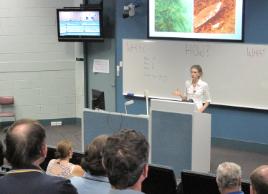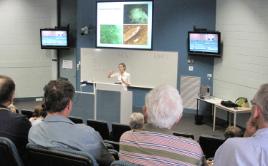Tourism and biodiversity potential make Keppel reefs special
Published on 18 October, 2012
Keppel Bay reefs have enormous tourism potential, representing one of the most outstanding, resilient and beautiful inshore coral reef systems of the Great Barrier Reef World Heritage Area.
That's according to CQUniversity Postdoctoral Researcher Dr Alison Jones who recently gave a presentation* summing up seven years of study in the Keppels.
LINK for a recording of the presentation

Dr Alison Jones presents seven years of research to colleagues and community members
"Easily accessible from the mainland coast and so far relatively untapped, this potential makes reef protection in the fringing reefs of this region of utmost importance in our obligation to conserve biodiversity, but also to protect and showcase the outstanding universal values of the Great Barrier Reef," Dr Jones said.
She said Keppel Bay has magnificent examples of both incipient (initial stage) fringing and fringing reefs, now with well-documented and unique coral biodiversity "not only because of their extremely high coral cover but also because of their sediment-tolerant specialist species such as soft and large-polyp species".
Dr Jones said the reefs have strong capacity for regeneration from floods, cyclones and bleaching, as evidenced by their recovery from the 1991 flood and the 2002 and 2006 bleaching events.
"Aside from these natural disturbance events, water quality is the single most critical issue influencing Keppel Bay reefs, with land-use-driven introduction of nutrients and herbicides being the two most threatening chronic processes," she said.
"Other chronic pressures include the localised depletion of species as a result of commercial aquarium harvest and anchor damage."
Dr Jones pointed out that intense research focus on the reefs in the region made the Keppels one of the most well-studied regions of the Great Barrier Reef.
"This is partly because the reefs form an almost discreet system, but also because they are extremely accessible to researchers - unlike many other regions. Local agencies have a sound body of research on which to draw for effective management decisions for the region."
* A presentation hosted by CQUniversity's Institute for Resource Industries and Sustainability (IRIS).



